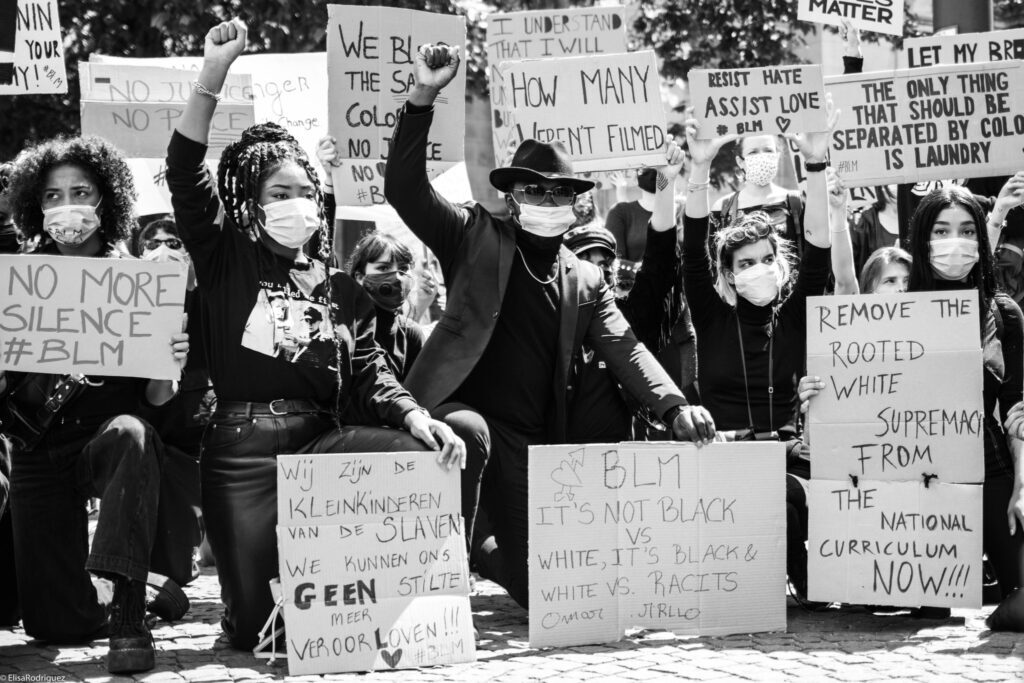
Justice Now? Tackling legacies of Europe’s colonial past in the wake of Black Lives Matter
The Justice Now? symposium gathers scholars, activists, and policymakers from Europe, North America, and Africa to examine current movements for justice for the impacts of Europe’s colonial past in Africa in the wake of the Black Lives Matter movement. Through virtual panels and roundtable discussions over the course of five days, speakers in areas such as transitional justice, racial justice, museum, legal, colonial and decolonial studies will discuss experiences and share strategies in the development of anti-racist and decolonial movements in and across their respective contexts. The symposium is convened by the Anthropology department at MIT in collaboration with international human rights NGO Avocats Sans Frontières, with generous support from the Dean’s Office, MIT School of Humanities, Arts, and Social Sciences.
The Black Lives Matter demonstrations in the US in the summer of 2020 following George Floyd’s killing in Minneapolis also sparked mass uprisings against systemic racism across Europe. These protests not only expressed solidarity with the American movement, but also called for European states to examine their own structural, race-based inequities, as well as their colonial pasts in Africa and the legacies thereof. Building on decades of anti-racism activism, Afro-diasporic and other activist groups in Europe have made demands ranging from the removal of statues of colonial figures and the renaming of public spaces, to the return of artifacts taken from African colonies and held in European museums, and financial reparations for the violences of colonization.
These demands have begun to yield fruits. In Belgium, for instance, a Special Commission tasked with examining Belgium’s colonial past in the Congo, Rwanda, and Burundi was established in July 2020. And, in a major step in the contemporary fight against racism and discrimination in the European Union, the EU’s 2020-25 Action Plan, delivered in September 2020, asserted the link between colonialism and the perpetuation of stereotypes and discrimination in European societies.
As these movements against racism unfold across North America and Europe, what does examining them transversally — across geography, history, and domains of practice — make visible about present opportunities for addressing Europe’s colonial past in Africa and its contemporary legacies? How might actions in different countries and regions amplify one another? What mechanisms are available in and across the arenas of law, policymaking, community organizing, and the arts for obtaining redress for these harms? What lessons can be carried over from historical undertakings?
This symposium, convened by the Department of Anthropology at MIT, in collaboration with Avocats Sans Frontières (ASF), aims to provide a platform for scholars, activists, and policymakers from Europe, North America, and Africa to tackle these questions. Over the course of five half-days of virtual panels and roundtable discussions, experts in areas such as transitional justice, racial justice, colonial and decolonial studies will share their experiences in the development of anti-racist and decolonial movements in and across their respective contexts.
The present moment offers a historic opportunity to both investigate and support anti-racist and decolonial efforts across national contexts and arenas of practice. We warmly invite you to join us in this cross-disciplinary gathering. Please direct inquiries to conveners at justicenowsymposium@gmail.com.
Register for the symposium! You can see the preliminary program here.
—
Information: https://justicenowsymposium.wordpress.com/